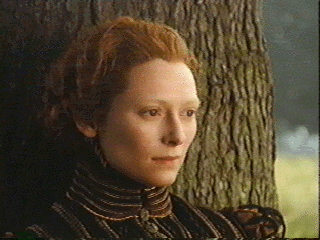How Fortunate the man with None

I have always loved Orlando yet never really considered it a good film. Of course, there is the fact that it is a Tilda Swinton vehicle. That always helps. I must say, the other film I have witnessed by Orlando's director, Sally Potter's Yes, was exceptionally dreadful. Orlando's clever casting of its two secondary stars is quite exceptional. Casting Quentin Crisp as Queen Elizabeth 1 is perhaps one of the boldest, yet most apt decisions of 90's independent film. Billy Zane, tool extroadinaire, is also truly wonderful here. Peppering the film are wonderful bit actors whom you may recognize from other independent efforts; actors who might portray a slight character in another film, here are given strong supporting character roles. Then there's the costuming!
Sally Potter, a Jarman descendant whose creativity lead to larger productions and bigger budgets, until, eventually an Oscar descended for her work on Shakespeare in Love, not to mention 6 other nominations (including an additional nomination that same year for Velvet Goldmine and one for Orlando). Though the shoestring budget is at times quite evident, the costuming is the main deceiver. At times - if one decides not to focus on the background, whose limited extra head count betrays the budget - the costuming convinces the viewer of whatever time the sequence may belong to. As the premise of Orlando rests in the fact that Swinton never change, the costuming becomes essential. Swinton, yet another Jarman heir (really, in many ways, this could have been a Jarman project, though, in his hands it would have lost much of its complexity) and Potter's love affair with her face is really what drives the movie. Swinton, who, as you may know is intended to be both male and female throughout the course of the films 400 year narrative, convinces more the latter than to the former, yet never begrudges us with disdain for looking. On the contrary, it could be argued that Swinton has built a career around that face, and for that, Orlando is her best advertisement. Just look at the film's final shot, as the camera holds on Swinton's face, her stare rivaling ours, her face seems to change, but does it? Is this altered countenance a shift in lighting, make-up, or am I merely seeking change where there is none? Swinton's face seems capable of anything, so change is a small feat for her.
Gender, which many people feel is the film's riding theme, is really more an arbitrary element to the greater purpose of the film. As Orlando is an aristocrat of the greatest pedigree, the perils of his life are trivial to those less fortunate. In one scene, as people make a slippery trek over the ice that covers the ground of Orlando's province. They fall and look the fool whilst Orlando, in a sled led by 6 struggling skaters, courts a novice Russian queen. The affront to the English people aside, Orlando recognizes not the follies of those who surround him, but is so invested in his own woes that the surroundings, times, even genders melt away without making the slightest effect on him. This is the state of the bourgeois. So self-involved, integral aspects of life: survival, gender and life, all fall by the wayside for whimsy and woe. If Potter's film (as opposed to Swinton's film, as it is both) succeeds anywhere it is here. The lord (or lady) Orlando, though our protagonist, never quite ceases to appear the fool.

0 Comments:
Post a Comment
<< Home